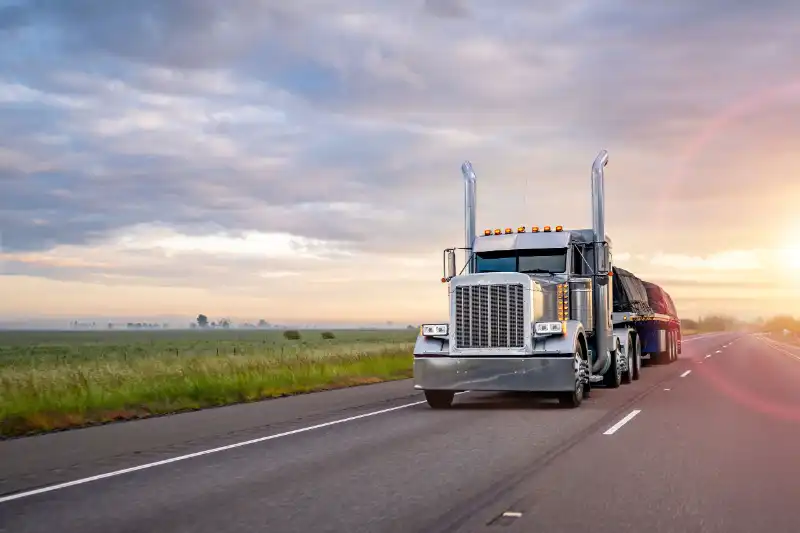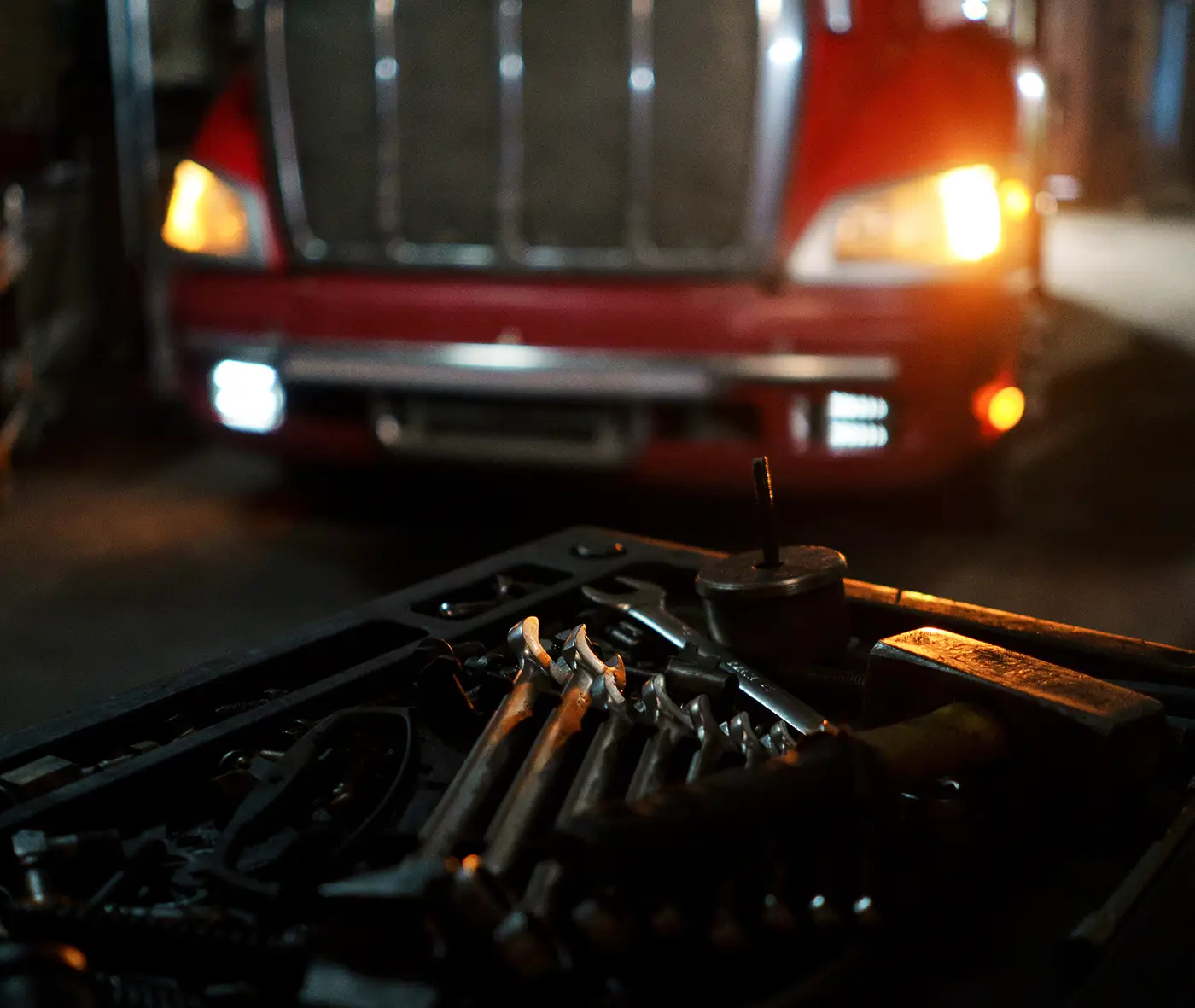.jpeg)
The Ultimate Guide To Heavy-Duty Truck Transmission Repair
Explore the world of heavy-duty truck transmission repair. Learn about types, signs of problems, and making informed decisions on repair or replacement.

Truck transmissions are designed to handle immense power and torque, translating the engine's raw force into controlled motion. They facilitate gear shifts, enabling trucks to move forward, reverse, and navigate steep inclines with ease. Without these complex systems, the very backbone of industries such as logistics, construction, and agriculture would come to a grinding halt.
The purpose of this comprehensive guide is to shed light on the critical topic of heavy-duty truck transmission repair. For truck drivers, fleet managers, and anyone involved in the trucking industry, understanding the intricacies of transmission repair is not just beneficial; it's essential.
In this article, we will navigate the intricate world of heavy-duty truck transmissions, covering everything from the signs of transmission problems to repair versus replacement decisions, and much more. Our aim is to equip you with the knowledge and insights needed to make informed decisions when it comes to your truck's transmission health.
Understanding Truck Transmissions
The Critical Role of Transmissions in Heavy-Duty Trucks
Truck transmissions are the workhorses of heavy-duty vehicles. They serve as the vital link between a truck's powerful engine and its ability to move tons of cargo across vast distances. Understanding the central role of transmissions is essential in appreciating their significance.
Heavy-duty transmissions are responsible for four key areas: power transformation, gear shifting, control and efficiency, and towing and hauling. They’re designed to convert the high-torque, low-speed output of the engine into various gear ratios, translating it into controlled forward or reverse motion. This transformation allows trucks to effectively manage different driving conditions, from steep inclines to highway cruising, all with the help of gear shifting.
Types of Transmissions in Heavy-Duty Trucks
Heavy-duty trucks come equipped with different types of transmissions, each offering specific advantages and suited to particular applications:
- Manual Transmissions: These traditional transmissions require the driver to manually shift gears using a clutch pedal. Manual transmissions offer precise control and are known for their durability. They are often preferred for heavy-duty off-road applications.
- Automatic Transmissions: Automatic transmissions are known for their ease of use. They shift gears automatically, making them a popular choice for long-haul trucking and stop-and-go driving. However, they can be less fuel-efficient than manual transmissions.
- Automated Manual Transmissions (AMTs): The top choice in the European market, AMTs combine the benefits of manual and automatic transmissions. They offer the convenience of automatic shifting while allowing manual control when needed. AMTs are gaining popularity in North America for their fuel efficiency and driver comfort.
Components of a Truck Transmission System
To understand truck transmissions fully, it's important to recognize their key components:
- Gearbox: The gearbox houses the gears and synchronizers responsible for gear shifting. It's where the magic of transforming engine power into forward or reverse motion happens.
- Clutch (Manual Transmissions): In manual transmissions, the clutch allows the driver to disconnect the engine from the gearbox temporarily, enabling gear changes.
- Torque Converter (Automatic Transmissions): Automatic transmissions use a torque converter to transmit power from the engine to the transmission. It's a critical component for smooth and automatic gear shifting.
- Transmission Fluid: Transmission fluid lubricates and cools the transmission components. It also plays a role in facilitating gear changes in automatic transmissions.
Understanding these components provides a foundation for comprehending how transmissions operate and how they can develop issues over time.
Signs of Transmission Problems
Detecting transmission problems early is crucial to prevent minor issues from escalating into costly repairs. Here are some of the most common symptoms that may indicate transmission problems in heavy-duty trucks:
Slipping Gears
One of the telltale signs of transmission trouble is when gears slip unexpectedly. This may manifest as a sudden loss of power or a feeling that the truck is struggling to stay in gear. Slipping gears can be a sign of worn clutch plates, damaged bands, or low transmission fluid.
Unusual Noises
Unusual sounds, such as grinding, whining, or clunking, can be indicative of transmission issues. These noises may occur during gear shifts or while the truck is in neutral. They could point to damaged gears, bearings, or a malfunctioning torque converter.
Delayed or Harsh Shifting
If you notice a delay in gear engagement or experience jarring, harsh shifts, it may signify problems with the transmission's hydraulic system, a worn clutch, or damaged synchronizers.
Fluid Leaks
Transmission fluid leaks, often identified by puddles or spots under the truck, are a clear sign of a problem. Leaks can result from worn seals, gaskets, or damaged transmission lines. Low fluid levels can lead to overheating and damage to internal components.
Warning Lights
Modern trucks are equipped with onboard diagnostics systems that can illuminate warning lights on the dashboard when transmission issues are detected. These lights should never be ignored and should prompt immediate inspection.
Burning Odor
A burning smell, often likened to the smell of burnt toast or hot oil, can indicate overheating transmission fluid. Overheating can occur due to various factors, including low fluid levels or excessive friction.
Don’t Ignore the Warning Signs
Given the potentially severe consequences of ignoring transmission problems, like reduced fuel efficiency, unplanned downtime, and expensive repairs down the line, it's crucial to emphasize the importance of early diagnosis and intervention. When drivers or fleet managers notice any of the aforementioned symptoms, it's wise to take immediate action. This may involve consulting with a qualified technician, conducting a diagnostic scan using modern tools, or performing visual inspections of the transmission system.
Transmission Repair or Replacement: Making Informed Decisions
When it comes to addressing transmission issues in heavy-duty trucks, making the right choice between repair and replacement is critical. Here, we'll explore the factors to consider when making this decision:
Factors to Consider Before Repairing
- Type and Severity of Damage: The first step is to assess the type and severity of the damage to your transmission. Minor issues like a worn clutch or a leaking seal may be suitable for repair. However, more extensive damage, such as gear wear or a damaged torque converter, might necessitate replacement.
- Age and Mileage: Consider the age of your truck and its mileage. Older trucks with high mileage may be more prone to additional transmission issues in the future. In such cases, it might be more cost-effective to opt for a replacement rather than pouring money into repairs.
- Repair Costs: Obtain quotes for the repair costs from reputable repair shops or service providers. Compare these estimates to the potential cost of a transmission replacement. It's essential to factor in both short-term and long-term expenses.
- Transmission Type: The type of transmission in your truck matters. Some transmission types, such as automated manual transmissions (AMTs), can be more challenging and costly to repair due to their complexity. Automatic transmissions, on the other hand, might have pricier replacement options.
Factors to Consider Before Replacing
- Compatibility: Ensure that the replacement transmission is compatible with your truck's make and model. The transmission should match the specifications and requirements of your vehicle.
- Cost of Replacement: Consider the cost of purchasing and installing a new or rebuilt transmission. Compare this cost to the repair estimates. While replacement can be more expensive upfront, it might offer long-term reliability and peace of mind.
- Warranty: Inquire about warranties for replacement transmissions. Reputable transmission suppliers often provide warranties that cover parts and labor. This can provide added protection against unexpected issues.
- Resale Value: If you plan to sell or trade your truck in the near future, the presence of a new or rebuilt transmission with a warranty can enhance the vehicle's resale value.
- Future Maintenance: Consider the long-term maintenance requirements of a replacement transmission. Some transmissions may require less maintenance and have longer service intervals, potentially reducing operating costs over time.
Consultation with Professionals
Ultimately, the decision to repair or replace a heavy-duty truck transmission should be based on a comprehensive assessment of these factors. It's advisable to consult with professionals, such as experienced truck mechanics or transmission specialists, who can provide expert insights and recommendations tailored to your specific situation.
Final Words
Your heavy-duty truck's transmission is an investment that deserves care and attention. By prioritizing proactive maintenance, adhering to recommended schedules, and fostering a culture of responsible driving, you can ensure the longevity of your transmission systems. This commitment not only minimizes downtime and repair costs but also contributes to safer, more efficient, and more reliable trucking operations.
Remember, a well-maintained transmission is not just a mechanical component; it's the backbone of your fleet, and its care is the key to your ongoing success in the world of heavy-duty trucking.
More Articles

Why Is Regular Fleet Maintenance Crucial for Business Success?

5 Mistakes to Avoid When Choosing a Repair Shop

Maximize Your Fleet Uptime with Proactive Maintenance!
Contact Us
Visit our full-service truck & trailer repair shop in Colona, Illinois, or take advantage of our mobile services offered throughout the Quad Cities area, including Moline & Rock Island, IL & Davenport & Bettendorf, IA. Give us a call, drop by the shop, or fill out our service request form!


